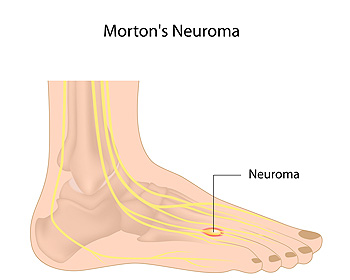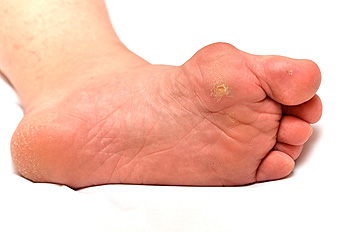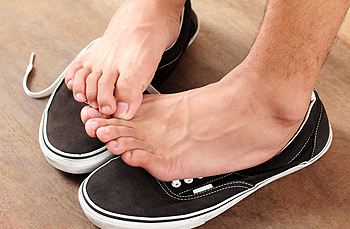Items filtered by date: January 2018
What Causes Hyperhidrosis?
Plantar hyperhidrosis is a disorder in which the feet exhibit excessive sweating. This condition can cause the patient to experience extreme discomfort as well as emotional anxiety and embarrassment. Athlete’s foot, toenail fungus, and foot infections may occur as a result of the feet constantly sweating. Hyperhidrosis is often a predisposed inherited condition and typically intensified by ingesting caffeine or eating specific foods. There are several ways to treat this condition, including washing and thoroughly drying the feet, wearing shoes that are made of thin material, and using a foot powder in the shoes. A consultation with a podiatrist is recommended for suggestions on how to make your feet more comfortable if you are affected by hyperhidrosis.
If you are suffering from hyperhidrosis contact our podiatrists of CNY Foot Surgery & Podiatry Care. Our doctors can provide the care you need to attend to all of your foot and ankle needs.
Hyperhidrosis of the Feet
Hyperhidrosis is a rare disorder that can cause people to have excessive sweating of their feet. This can usually occur all on its own without rigorous activity involved. People who suffer from hyperhidrosis may also experience sweaty palms.
Although it is said that sweating is a healthy process meant to cool down the body temperature and to maintain a proper internal temperature, hyperhidrosis may prove to be a huge hindrance on a person’s everyday life.
Plantar hyperhidrosis is considered to be the main form of hyperhidrosis. Secondary hyperhidrosis can refer to sweating that occurs in areas other than the feet or hands and armpits. Often this may be a sign of it being related to another medical condition such as menopause, hyperthyroidism and even Parkinson’s disease.
In order to alleviate this condition, it is important to see your doctor so that they may prescribe the necessary medications so that you can begin to live a normal life again. If this is left untreated, it is said that it will persist throughout an individual’s life.
A last resort approach would be surgery, but it is best to speak with your doctor to find out what may be the best treatment for you.
If you have any questions please feel free to contact our office located in East Syracuse, NY . We offer the newest diagnostic and treatment technologies for all your foot and ankle needs.
Do Your Child's Feet Hurt?
Common Foot Issues Affecting Seniors
 As the aging process occurs, the cushioning in the feet becomes thinner and the nails can become brittle and dry. Sores on the feet may take longer to heal typically due to poor circulation, a common ailment in elderly people. Walking, stretching, and keeping the legs uncrossed are all beneficial in keeping the blood flowing freely. Feet generally become larger over time, and choosing shoes that avoid friction is necessary for a comfortable fit. There are several foot issues elderly people are most likely to experience, including athlete’s foot, dry skin, and ingrown toenails. These conditions may be prevented by washing and drying the feet thoroughly, especially in between the toes. When the toenails are properly trimmed, ingrown toenails may be avoided. Applying a moisturizer on the feet will not only feel good, but help keep the skin from getting dry. Please consult with a podiatrist if you have any questions regarding elderly foot care.
As the aging process occurs, the cushioning in the feet becomes thinner and the nails can become brittle and dry. Sores on the feet may take longer to heal typically due to poor circulation, a common ailment in elderly people. Walking, stretching, and keeping the legs uncrossed are all beneficial in keeping the blood flowing freely. Feet generally become larger over time, and choosing shoes that avoid friction is necessary for a comfortable fit. There are several foot issues elderly people are most likely to experience, including athlete’s foot, dry skin, and ingrown toenails. These conditions may be prevented by washing and drying the feet thoroughly, especially in between the toes. When the toenails are properly trimmed, ingrown toenails may be avoided. Applying a moisturizer on the feet will not only feel good, but help keep the skin from getting dry. Please consult with a podiatrist if you have any questions regarding elderly foot care.
Proper foot care is something many older adults forget to consider. If you have any concerns about your feet and ankles, contact our podiatrists from CNY Foot Surgery & Podiatry Care. Our doctors can provide the care you need to keep you pain-free and on your feet.
The Elderly and Their Feet
As we age we start to notice many changes in our body, but the elder population may not notice them right away. Medical conditions may prevent the elderly to take notice of their foot health right away. Poor vision is a lead contributor to not taking action for the elderly.
Common Conditions
- Neuropathy – can reduce feeling in the feet and can hide many life-threatening medical conditions.
- Reduced flexibility – prevents the ability of proper toenail trimming, and foot cleaning. If left untreated, it may lead to further medical issues.
- Foot sores – amongst the older population can be serious before they are discovered. Some of the problematic conditions they may face are:
- Gouging toenails affecting nearby toe
- Shoes that don’t fit properly
- Pressure sores
- Loss of circulation in legs & feet
- Edema & swelling of feet and ankles
Susceptible Infections
Diabetes and poor circulation can cause general loss of sensitivity over the years, turning a simple cut into a serious issue.
If you have any questions please feel free to contact our office located in East Syracuse, NY . We offer the newest diagnostic and treatment technologies for all your foot and ankle needs.
Techniques For the Aged to Prevent Falling
 Falls among people aged 65 or older can be extremely serious and are considered a leading cause of injuries in that age group. A fall can be hard in lots of ways, and people may become depressed after experiencing one. This can result in lacking the desire to stay active. There are several things to be aware of in the aging person, including their vision becoming weaker, causing objects to become harder to see; this may possibly lead to a fall. Some medications may cause dizziness and dehydration, which may also be responsible for a fall occurring. It may be beneficial to ask older people when their last eye exam was and to ensure that their eyeglass prescription is current. Discussing medications currently being taken may be advised to identify any potential drug interactions; drug interactions can possibly cause an imbalance and contribute to a potential fall. Typically, checking the lighting in the home, in addition to having secure rails on the stairway and installing bars in the tub area, may all be effective ways in preventing falls in the home.
Falls among people aged 65 or older can be extremely serious and are considered a leading cause of injuries in that age group. A fall can be hard in lots of ways, and people may become depressed after experiencing one. This can result in lacking the desire to stay active. There are several things to be aware of in the aging person, including their vision becoming weaker, causing objects to become harder to see; this may possibly lead to a fall. Some medications may cause dizziness and dehydration, which may also be responsible for a fall occurring. It may be beneficial to ask older people when their last eye exam was and to ensure that their eyeglass prescription is current. Discussing medications currently being taken may be advised to identify any potential drug interactions; drug interactions can possibly cause an imbalance and contribute to a potential fall. Typically, checking the lighting in the home, in addition to having secure rails on the stairway and installing bars in the tub area, may all be effective ways in preventing falls in the home.
Preventing falls among the elderly is very important. If you are older and have fallen or fear that you are prone to falling, consult with our podiatrists from CNY Foot Surgery & Podiatry Care. Our doctors will assess your condition and provide you with quality advice and care.
Every 11 seconds, an elderly American is being treated in an emergency room for a fall related injury. Falls are the leading cause of head and hip injuries for those 65 and older. Due to decreases in strength, balance, senses, and lack of awareness, elderly persons are very susceptible to falling. Thankfully, there are a number of things older persons can do to prevent falls.
How to Prevent Falls
Some effective methods that older persons can do to prevent falls include:
- Enrolling in strength and balance exercise program to increase balance and strength
- Periodically having your sight and hearing checked
- Discuss any medications you have with a doctor to see if it increases the risk of falling
- Clearing the house of falling hazards and installing devices like grab bars and railings
- Utilizing a walker or cane
- Wearing shoes that provide good support and cushioning
- Talking to family members about falling and increasing awareness
Falling can be a traumatic and embarrassing experience for elderly persons; this can make them less willing to leave the house, and less willing to talk to someone about their fears of falling. Doing such things, however, will increase the likelihood of tripping or losing one’s balance. Knowing the causes of falling and how to prevent them is the best way to mitigate the risk of serious injury.
If you have any questions, please feel free to contact our office located in East Syracuse, NY . We offer the newest diagnostic and treatment technologies for all your foot care needs.
Causes of Morton’s Neuroma
 If the nerve between one of the toes becomes irritated and inflamed, it’s most commonly referred to as a condition called Morton’s neuroma. Middle-aged women may be more affected than men, possibly because of high heels being worn or shoes fitting too tightly. Jogging may also put pressure on the toes, so runners may be affected as well. Occasionally, other conditions can cause Morton’s neuroma, which typically may include flat feet or bunions. There may be several treatments for this ailment, including massaging and resting the foot, utilizing orthotic devices, which may help to relieve pressure, and choosing a shoe with a wider toe. For patients who experience severe pain, surgery may be an option; part of the nerve may be removed or the space around the nerve may be increased. Please consult a podiatrist for a proper diagnosis and the best treatment option available for you.
If the nerve between one of the toes becomes irritated and inflamed, it’s most commonly referred to as a condition called Morton’s neuroma. Middle-aged women may be more affected than men, possibly because of high heels being worn or shoes fitting too tightly. Jogging may also put pressure on the toes, so runners may be affected as well. Occasionally, other conditions can cause Morton’s neuroma, which typically may include flat feet or bunions. There may be several treatments for this ailment, including massaging and resting the foot, utilizing orthotic devices, which may help to relieve pressure, and choosing a shoe with a wider toe. For patients who experience severe pain, surgery may be an option; part of the nerve may be removed or the space around the nerve may be increased. Please consult a podiatrist for a proper diagnosis and the best treatment option available for you.
Morton’s neuroma is a very uncomfortable condition to live with. If you think you have Morton’s neuroma, contact our podiatrists of CNY Foot Surgery & Podiatry Care. Our doctors will attend to all of your foot care needs and answer any of your related questions.
Morton’s Neuroma
Morton's neuroma is a painful foot condition that commonly affects the areas between the second and third or third and fourth toe, although other areas of the foot are also susceptible. Morton’s neuroma is caused by an inflamed nerve in the foot that is being squeezed and aggravated by surrounding bones.
What Increases the Chances of Having Morton’s Neuroma?
- Ill-fitting high heels or shoes that add pressure to the toe or foot
- Jogging, running or any sport that involves constant impact to the foot
- Flat feet, bunions, and any other foot deformities
Morton’s neuroma is a very treatable condition. Orthotics and shoe inserts can often be used to alleviate the pain on the forefront of the feet. In more severe cases, corticosteroids can also be prescribed. In order to figure out the best treatment for your neuroma, it’s recommended to seek the care of a podiatrist who can diagnose your condition and provide different treatment options.
If you have any questions, please feel free to contact our office located in East Syracuse, NY . We offer the newest diagnostic and treatment technologies for all your foot care needs.
Wounds That Don't Heal Need to Be Checked
How to Prevent Corns
 Coupled with friction, an excessive amount of pressure on the feet is the most probable cause of corns. Corns can cause the skin to become dry and hardened; the skin’s consistency can also become soft and rubbery, which most often occurs between the toes. Infections can be common for patients with poor circulation or diabetes, and treatment may be necessary to prevent complications. Many options are available for treating corns. Pumice stones are an effective way to remove thickened skin from the foot, though if used incorrectly they can cause damage. The use of foam wedges between the toes may also be recommended to relieve pressure from soft corns. Wearing supportive shoes, preferably with a low heel, may be helpful as well. A consultation with a podiatrist is advised for a diagnosis and assessment of any underlying causes of corns.
Coupled with friction, an excessive amount of pressure on the feet is the most probable cause of corns. Corns can cause the skin to become dry and hardened; the skin’s consistency can also become soft and rubbery, which most often occurs between the toes. Infections can be common for patients with poor circulation or diabetes, and treatment may be necessary to prevent complications. Many options are available for treating corns. Pumice stones are an effective way to remove thickened skin from the foot, though if used incorrectly they can cause damage. The use of foam wedges between the toes may also be recommended to relieve pressure from soft corns. Wearing supportive shoes, preferably with a low heel, may be helpful as well. A consultation with a podiatrist is advised for a diagnosis and assessment of any underlying causes of corns.
If you have any concerns regarding your feet and ankles, contact our podiatrists of CNY Foot Surgery & Podiatry Care. Our doctors will treat your foot and ankle needs.
Corns: What Are They? and How Do You Get Rid of Them?
Corns can be described as areas of the skin that have thickened to the point of becoming painful or irritating. They are often layers and layers of the skin that have become dry and rough, and are normally smaller than calluses.
Ways to Prevent Corns
There are many ways to get rid of painful corns such as wearing:
- Well-fitting socks
- Comfortable shoes that are not tight around your foot
- Shoes that offer support
Treating Corns
Treatment of corns involves removing the dead skin that has built up in the specific area of the foot. Consult with Our doctors to determine the best treatment option for your case of corns.
If you have any questions please feel free to contact our office located in East Syracuse, NY . We offer the newest diagnostic and treatment technologies for all your foot and ankle needs.







